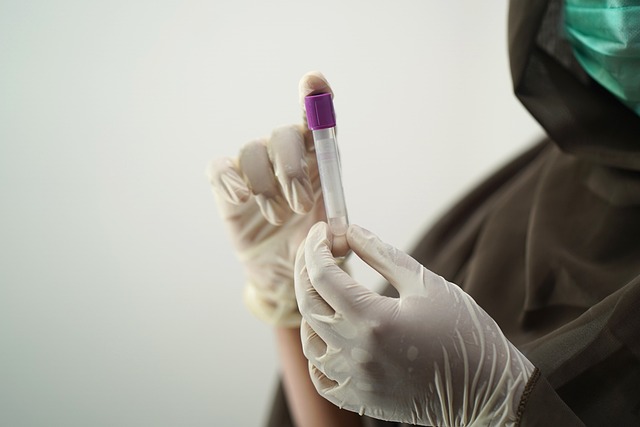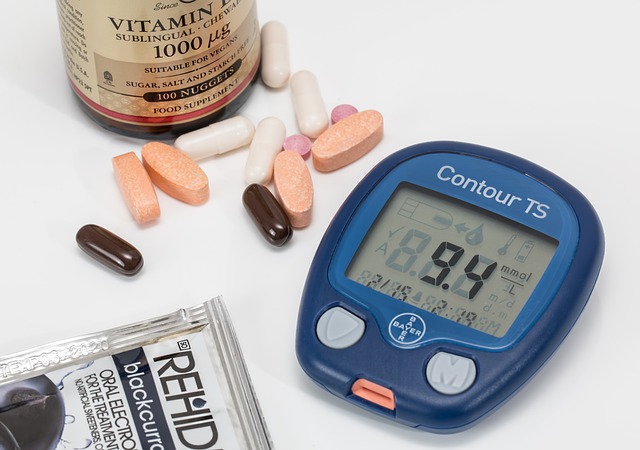The UK Diabetes Blood Test is an essential diagnostic tool that measures Vitamin D levels alongside blood glucose to monitor overall health and diabetes risk. It's crucial for individuals at risk of Vitamin D deficiency, including those with darker skin, frequent sunscreen use, the elderly, or limited sun exposure. Optimal Vitamin D levels are categorized as above 30 ng/ml (optimal), between 21 and 29 ng/ml (adequate), and below 20 ng/ml (insufficient). Regular testing informs dietary choices or supplementation to maintain health, particularly important in the UK due to its high latitude and less intense sunlight. Vitamin D not only supports bone health and immune function but also plays a significant role in maintaining insulin sensitivity and glycaemic control, key for diabetes management. Adequate Vitamin D levels can reduce the risk of developing type 2 diabetes and prevent complications for those who already have it. The UK Diabetes Blood Test is thus a vital component of preventive healthcare and diabetes care within the UK Health System, providing personalized care to optimize health outcomes.
UK residents often ponder the role of vitamin D in their health, a nutrient that transcends mere bone health. This article demystifies the importance of monitoring Vitamin D levels through a UK Diabetes Blood Test, a critical component of diabetes management and overall wellness. We delve into understanding its significance, the testing process, and how to interpret results within the UK’s healthcare framework. By illuminating these aspects, individuals can better navigate their health journey, ensuring they maintain optimal Vitamin D levels for diabetes control and general vitality.
- Understanding the Importance of Vitamin D Levels for Health in the UK: A Guide to UK Diabetes Blood Test
- The Process and Significance of Vitamin D Levels Testing for Diabetes Management in the UK
- Interpreting Your Vitamin D Levels Test Results: Implications for Diabetes and Overall Wellness in the Context of the UK Health System
Understanding the Importance of Vitamin D Levels for Health in the UK: A Guide to UK Diabetes Blood Test

In the UK, maintaining optimal Vitamin D levels is crucial for overall wellness, particularly given the country’s northerly latitude which can lead to lower sunlight exposure throughout the year. Vitamin D plays a pivotal role in bone health, immune function, and has been linked to a reduced risk of certain diseases, including diabetes. A UK Diabetes Blood Test is an essential tool for assessing Vitamin D status, providing individuals with valuable insights into their health. This test measures the level of vitamin D in the blood, specifically looking at 25-hydroxyvitamin D [25(OH)D], which is the most reliable indicator of vitamin D stores. Understanding the results is key; levels below 20 ng/ml are considered insufficient, between 21 and 29 ng/ml as adequate for most people, and above 30 ng/ml as optimal. Regular testing can inform dietary or supplementation adjustments to ensure that Vitamin D levels remain within these healthy ranges.
For those at risk of Vitamin D deficiency—such as individuals with darker skin, those who cover up or use high SPF sunscreen regularly, the elderly, and people with limited exposure to sunlight—a UK Diabetes Blood Test is particularly beneficial. It not only aids in the early detection of diabetes but also serves as a comprehensive health check for Vitamin D levels. This test can be performed as part of routine healthcare or specifically requested by individuals seeking to optimize their health and prevent potential deficiencies that could compromise their well-being. By staying informed about one’s Vitamin D levels through the UK Diabetes Blood Test, individuals can take proactive steps towards maintaining their health and potentially reducing their risk of developing diabetes or other related conditions.
The Process and Significance of Vitamin D Levels Testing for Diabetes Management in the UK

In the UK, diabetes management encompasses a comprehensive approach that includes regular monitoring of various biomarkers, with vitamin D levels testing being an integral part. The process begins with a healthcare provider recommending a UK Diabetes Blood Test, which measures blood glucose levels alongside other relevant parameters, including vitamin D. This micronutrient plays a pivotal role in regulating blood sugar levels and insulin sensitivity. Vitamin D deficiency has been linked to a higher risk of developing type 2 diabetes and can also affect the management of existing conditions. The test involves a simple blood sample collection, which is then analysed in a laboratory to determine the vitamin D concentrations in the individual’s serum. This information helps healthcare professionals tailor dietary recommendations and supplementation plans to optimise vitamin D levels, potentially improving glycaemic control and overall diabetes management.
The significance of vitamin D levels testing for diabetes management cannot be overstated. In the UK, where sunlight exposure may be limited due to climate and lifestyle factors, a substantial proportion of the population could be at risk of vitamin D insufficiency or deficiency. Regular testing allows for early identification and intervention, which is key to preventing the progression of diabetes and its associated complications. Moreover, adequate vitamin D levels have been shown to correlate with better glycaemic control, reduced insulin resistance, and a decreased risk of diabetes-related complications. Therefore, incorporating UK Diabetes Blood Tests as part of routine diabetes care is essential for comprehensive management and supporting the wellness of individuals with diabetes in the UK.
Interpreting Your Vitamin D Levels Test Results: Implications for Diabetes and Overall Wellness in the Context of the UK Health System

In the UK, understanding the implications of Vitamin D levels is pivotal for maintaining overall wellness, particularly in the context of diabetes management. A Vitamin D levels test, commonly included in the UK Diabetes Blood Test panel, provides insight into an individual’s nutritional status and its potential impact on blood sugar regulation. According to guidelines, a serum 25-hydroxyvitamin D level of less than 20 ng/ml is considered insufficient, while levels between 21 and 29 ng/ml are considered adequate. Levels above 30 ng/ml are often regarded as optimal. Notably, Vitamin D deficiency has been associated with a higher risk of developing type 2 diabetes, as well as complications in those who already have the condition. For individuals with diabetes, maintaining sufficient Vitamin D levels can enhance insulin sensitivity and contribute to glycaemic control. Additionally, Vitamin D plays a role in immune function, bone health, and overall inflammatory response, all of which are crucial for wellness. Patients should discuss their test results with their healthcare provider to interpret the findings within the broader context of their individual health profile and to determine appropriate supplementation or lifestyle adjustments if needed, as part of a comprehensive diabetes management plan within the UK Health System. Regular monitoring and understanding these levels are essential components in the prevention and management of diabetes-related complications and in promoting overall wellness across the UK population.
In conclusion, maintaining optimal Vitamin D levels is a critical aspect of overall wellness, particularly for individuals managing diabetes within the UK. Regular UK Diabetes Blood Tests provide valuable insights into one’s vitamin D status, which can inform lifestyle adjustments and medical interventions to manage both blood sugar levels and bone health. By understanding the results of these tests, as detailed in our guide, individuals can tailor their diet, sun exposure, and supplementation to improve their health outcomes. It is clear that Vitamin D testing is an integral component of diabetes management and general wellbeing in the UK health context. Therefore, it is advisable for individuals to discuss with their healthcare providers the role of vitamin D in their health plan and to undergo regular UK Diabetes Blood Tests to ensure they are within the recommended range for optimal health.
